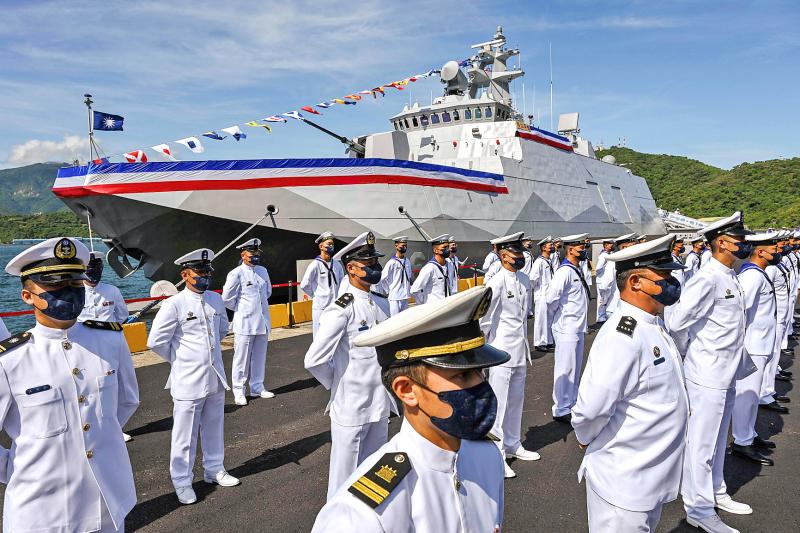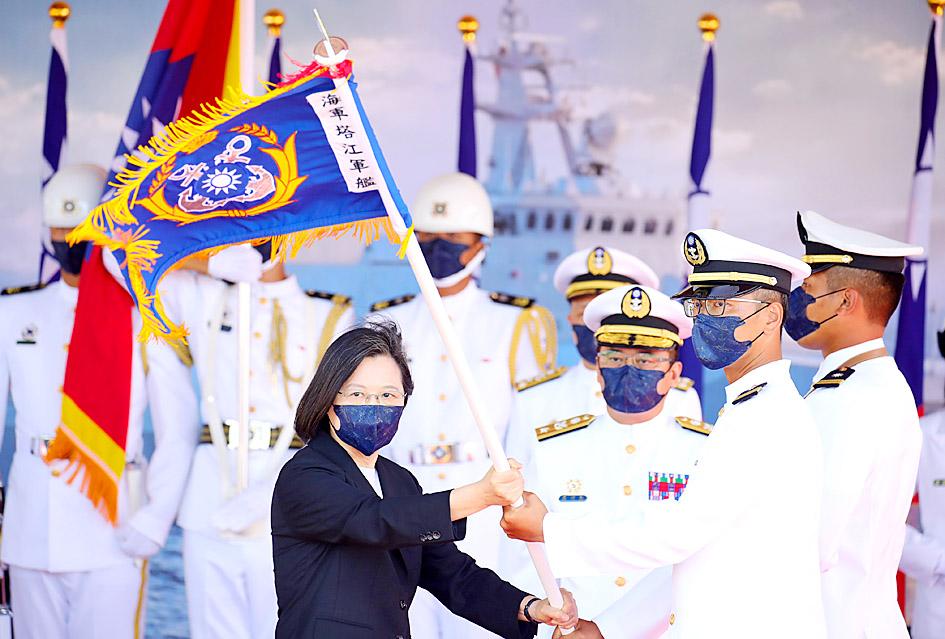The Ta Chiang-class corvette, in entering service, would bolster the navy’s anti-air capabilities, demonstrate Taiwan’s resolve to defend its maritime borders and showcase domestic design in the service of national defense, President Tsai Ing-wen (蔡英文) told a ceremony at the military harbor in Yilan County’s Suao Township (蘇澳) yesterday.
Tsai recalled naming the corvette in December last year, saying that military members should aspire to live up to its name — to be as fierce in battle as Paiwans (排灣) living along the Tawa River (塔瓦溪) — so that Taiwanese can witness the armed forces’ commitment to defending their nation and homes.
The Ta Chiang’s excellent design has garnered international acclaim and is the “pride of Taiwan,” she said.

Photo: Sam Yeh, AFP
Tsai thanked the navy’s officers and sailors, the Chungshan Institute of Science and Technology (CSIST) and the Lung Teh Shipbuilding Co (龍德造船) for all of the hard work that went into meeting the deadline.
Separately, the navy said that the Ta Chiang is highly mobile and armed with the CSIST’s most recent anti-air missile, a ship-based version of the Tien Chien II (Sky Sword) missile.
Unlike the Tuo Jiang-class corvette, the 700-tonne Ta Chiang is equipped with four Hsiung Feng III (“Brave Wind III”) supersonic anti-surface missiles, eight Hsiung Feng II subsonic anti-surface missiles and two eight-cell launchers for the Hai Chien II (Sea Sword) missiles.

Photo: Cheng I-hwa, Bloomberg
The navy said that the Ta Chiang — equipped with more advanced radar systems and armed with state-of-the-art anti-air missiles — would markedly increase its anti-air capabilities.
The corvette is to be assigned to its 131 Flotilla, the navy added.
It is the duty of all officers and sailors to keep the Taiwan Strait safe and to ensure that vessels flying Taiwan’s colors have smooth and undisrupted passage, the navy said.
“We hope the public will continue to support the national defense policies of the government and the buildup of next-generation armaments to bolster the navy’s capability to defend the nation,” it said.
The Ta Chiang corvette would be based at the Port of Keelung, Democratic Progressive Party Legislator Tsai Shih-ying (蔡適應) said, adding that the next two corvettes are expected to be put into service in the third quarter of next year.
The navy — with a future fleet of 12 Tuo Jiang-class corvettes, alongside 31 Kuang Hua VI-class fast attack missile crafts, highly mobile land-based missile trucks and other vessels capable of being converted into military boats — would have a highly effective anti-surface force, he said.
The ceremony was also attended by Minister of National Defense Chiu Kuo-cheng (邱國正), National Security Council member Huang Shu-kuang (黃曙光) and Veterans Affairs Council Minister Feng Shih-kuan (馮世寬).

The US government has signed defense cooperation agreements with Japan and the Philippines to boost the deterrence capabilities of countries in the first island chain, a report by the National Security Bureau (NSB) showed. The main countries on the first island chain include the two nations and Taiwan. The bureau is to present the report at a meeting of the legislature’s Foreign Affairs and National Defense Committee tomorrow. The US military has deployed Typhon missile systems to Japan’s Yamaguchi Prefecture and Zambales province in the Philippines during their joint military exercises. It has also installed NMESIS anti-ship systems in Japan’s Okinawa

‘WIN-WIN’: The Philippines, and central and eastern European countries are important potential drone cooperation partners, Minister of Foreign Affairs Lin Chia-lung said Minister of Foreign Affairs Lin Chia-lung (林佳龍) in an interview published yesterday confirmed that there are joint ventures between Taiwan and Poland in the drone industry. Lin made the remark in an exclusive interview with the Chinese-language Liberty Times (the Taipei Times’ sister paper). The government-backed Taiwan Excellence Drone International Business Opportunities Alliance and the Polish Chamber of Unmanned Systems on Wednesday last week signed a memorandum of understanding in Poland to develop a “non-China” supply chain for drones and work together on key technologies. Asked if Taiwan prioritized Poland among central and eastern European countries in drone collaboration, Lin

BACK TO WORK? Prosecutors said they are considering filing an appeal, while the Hsinchu City Government said it has applied for Ann Kao’s reinstatement as mayor The High Court yesterday found suspended Hsinchu mayor Ann Kao (高虹安) not guilty of embezzling assistant fees, reducing her sentence to six months in prison commutable to a fine from seven years and four months. The verdict acquitted Kao of the corruption charge, but found her guilty of causing a public official to commit document forgery. The High Prosecutors’ Office said it is reviewing the ruling and considering whether to file an appeal. The Taipei District Court in July last year sentenced Kao to seven years and four months in prison, along with a four-year deprivation of civil rights, for contravening the Anti-Corruption

NO CONFIDENCE MOTION? The premier said that being toppled by the legislature for defending the Constitution would be a democratic badge of honor for him Premier Cho Jung-tai (卓榮泰) yesterday announced that the Cabinet would not countersign the amendments to the local revenue-sharing law passed by the Legislative Yuan last month. Cho said the decision not to countersign the amendments to the Act Governing the Allocation of Government Revenues and Expenditures (財政收支劃分法) was made in accordance with the Constitution. “The decision aims to safeguard our Constitution,” he said. The Constitution stipulates the president shall, in accordance with law, promulgate laws and issue mandates with the countersignature of the head of the Executive Yuan, or with the countersignatures of both the head of the Executive Yuan and ministers or